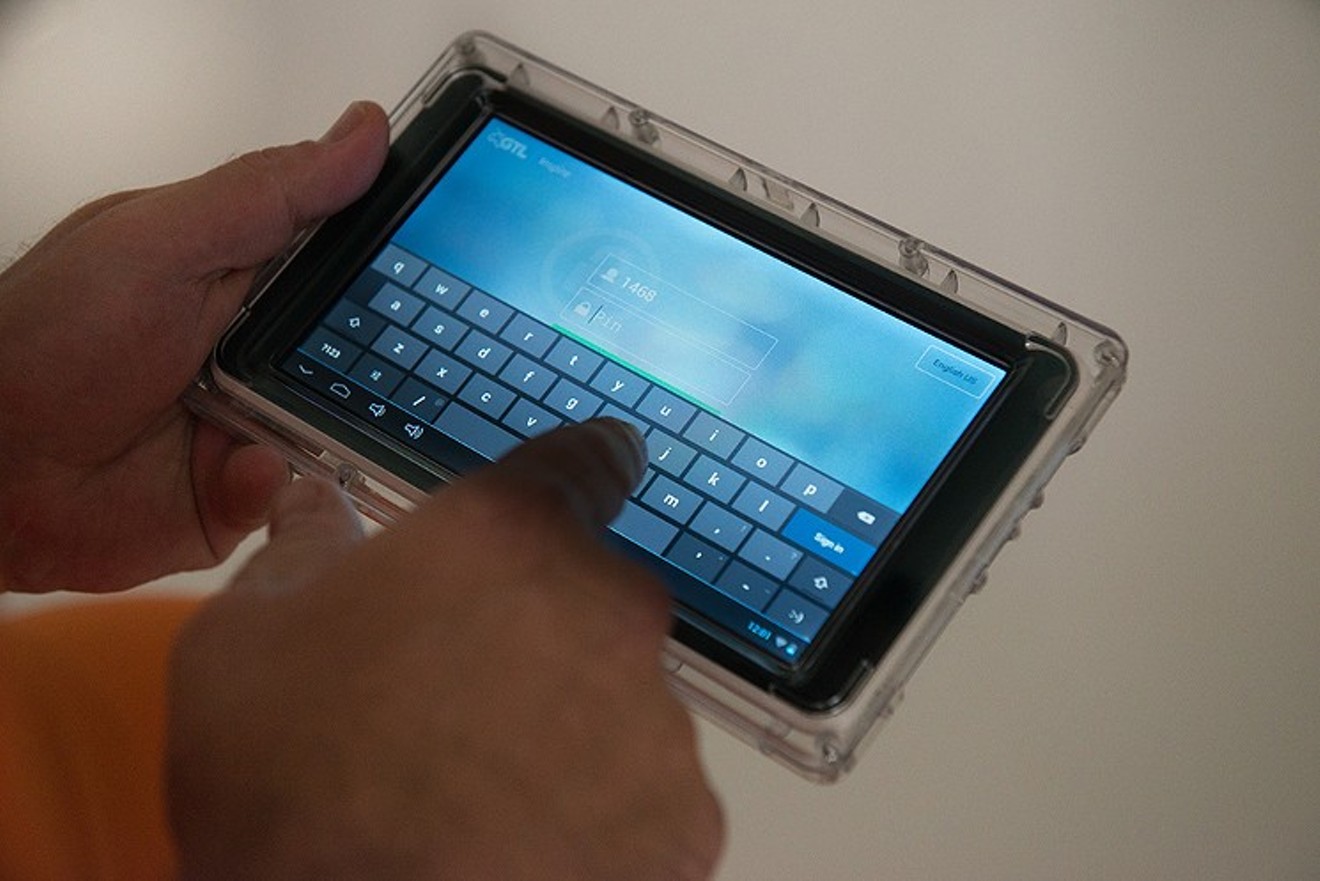Since we first reported back in February on the Colorado Department of Corrections' controversial plan to supply state prisoners with electronic tablets, the story has generated predictable responses from several media outlets, grousing about "pampered" convicts getting perks that many law-abiding citizens can't afford. But a new report from the Prison Policy Initiative delves deeply into Colorado's tablet program and concludes that the arrangement strongly favors Global Tel-Link, the private company supplying the devices, at the expense of the inmates.
The handheld devices are being distributed free of charge to every prisoner in the state system. They can be used for phone calls and messaging as well as to access video games and music. GTL, which also operates the prison system's current phone service, collects fees for each service, from 49 cents per message to up to twenty bucks a month for a music subscription. The idea was to make it easier for inmates to communicate with loved ones, connect with programming and manage other aspects of being incarcerated — while security features of the tablets would prevent unauthorized calls or Internet access.
But PPI's analysis of the state's contract with GTL concludes that the deal invites price-gouging and promotes tablet services geared toward relieving boredom rather than providing substantive educational opportunities. "Failing to provide incarcerated people with useful technology through a well-thought-out program, the Colorado/GTL contract exploits consumers by obscuring important details, incentivizing private interests, and charging exorbitant fees," writes the report's author, Stephen Raher.
GTL pays the DOC a flat $800,000 a year for the right to supply phone services, tablets, video visitation and money transfers to its prisoners on an exclusive basis; in exchange, the company collects all the revenues generated by the services — fees that, the report points out, are often paid by low-income family members of indigent inmates. And except for complying with annoying FCC requirements and the like, GTL gets to set the fees and change them at will. The 49-cent messages are apparently tied to the class of a first-class stamp, which Raher points out has no economic basis at all; the music charges are double what a free person would pay for Spotify or a similar service; and the game "rental" fees are well in excess of what it would cost to buy them online.
Although prison officials seem optimistic that the tablets can eventually be used to make vocational and educational programming available to inmates, Raher's own reading of the contracts suggests that some serious financial barriers exist to making that transition. He presents Colorado's experiment as a cautionary tale, "a case study in how new technologies can be implemented in ways that financially exploit incarcerated people and their support networks. Other jurisdictions should view the Colorado experience with caution and strive to develop better, more humane models for bringing prison communications into the 21st century."
[
{
"name": "Air - MediumRectangle - Inline Content - Mobile Display Size",
"component": "12017618",
"insertPoint": "2",
"requiredCountToDisplay": "2"
},{
"name": "Editor Picks",
"component": "17242653",
"insertPoint": "4",
"requiredCountToDisplay": "1"
},{
"name": "Inline Links",
"component": "18838239",
"insertPoint": "8th",
"startingPoint": 8,
"requiredCountToDisplay": "7",
"maxInsertions": 25
},{
"name": "Air - MediumRectangle - Combo - Inline Content",
"component": "17261320",
"insertPoint": "8th",
"startingPoint": 8,
"requiredCountToDisplay": "7",
"maxInsertions": 25
},{
"name": "Inline Links",
"component": "18838239",
"insertPoint": "8th",
"startingPoint": 12,
"requiredCountToDisplay": "11",
"maxInsertions": 25
},{
"name": "Air - Leaderboard Tower - Combo - Inline Content",
"component": "17261321",
"insertPoint": "8th",
"startingPoint": 12,
"requiredCountToDisplay": "11",
"maxInsertions": 25
}
]












